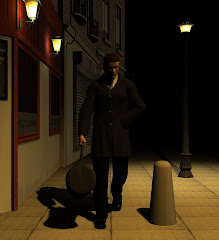To fill up some space, here's an article I wrote one spiteful Sunday a few months back:
I went to school with Shed Seven. Three quarters of them at least; Rick Whitter, Tom Gladwin and Paul Banks. Two of them were perfectly pleasant, if slightly cocky, boys. The other was appallingly vain and self-regarding even as a child.. I shudder to think what years of pop stardom may have done to his already inflated ego. So if any hapless roadies are wondering: yes, he always has been like that.
Anyway, our shared background meant I saw the band in their formative years. I watched them travel through their first manifestation, Brockley Haven, and into 'The Shedders' (as nobody ever called them). Their talent was always obvious. Compared to the usual dreadful school bands, especially my own, they were slick and professional. They sounded like a proper group. Even my parents, not known for their musical perspicacity, tipped them for great things after watching Brockley Haven at a Comic Relief performance. If anybody from Huntington School was going to be a star it was Whitter, Gladwin and Banks; aided by that other one, of course.
And they did make it. They became stars. Polydor signed them in 1994. Their first hit came soon after and a lot more followed. In one year they managed more chart entries than anybody else. Combining catchy tunes and cliched phrases, their songs were also perfect for TV background music. A particular case in point was Going For Gold, which was less-than-coincidentally released just before the 1996 Olympics. Though NME once declared "There's no-one thicker than a thick Rick Whitter," he did have a few good jokes. Asked about their name once, he said there was once eleven of them but they had "shed seven members." Also breaking through at much the same time was another York denizen, the writer Kate Atkinson. Things were looking good in the old backwater. It was rather optimistic to talk about a 'scene,' but as the last celebrity to emerge from the city was Constantine the Great, we were understandably excited.
And yet, of course, and yet. The thing about Kate Atkinson was that she was brilliant. The thing about Shed Seven was that, well, they weren't. Their songs were clunky, turgid and derivative. Sometimes they were barely competent. I don't think they were ruined by fame of the evil exploits of Polydor. It was more a case of the best football player at school. He scores legions of goals, he perpetually humiliates his fellow pupils, he seems touched by genius. And after leaving school he fails trials at Torquay and Shrewsbury and ends up at Burton Albion if he's lucky. Shed Seven had a few half-decent tunes; the breakthrough number Dolphin, the slow-burning . But they rose solely because of Britpop and could only fall when it did.
Britpop was the big thing of the mid 90's. For no discernible reason, mouthy, slightly grubby indie kids came into fashion and started shifting units. Some bands like Oasis were new but a telling number were ageing chancers suddenly finding a good thing. Blur, for example, were Thames Valley shoegazers until they decided to be East End cockneys. Radiohead worked through various personas before settling on the style Half Man Half Biscuit labelled 'Moodychops.' I say 'telling' because, unlike grunge, house, rap, punk and virtually every other movement, Britpop had absolutely no innovations. It mostly just marked a return to four-piece guitar bands singing simple love ditties. Although it got associated with that ludicrous post-Blair election 'Cool Britannia' thing, Britpop first emerged in the Major years; and so was fittingly Back to Basics. All it did was briefly allow the rock boys to outsell the R & B girls. Now the R & B girls dominate again and it's hard to see why anybody bothered.
The best thing about Britpop was that genuinely talented artists – Pulp, Cornershop, PJ Harvey – could use it as a Trojan horse to sneak into the charts. The worst thing, as with any trend which overstays its welcome, were the coat tail hangers. Oasis and Radiohead would have probably flourish in any climate. But there were an awful lot of outfits who would otherwise have, deservedly, remained in the early afternoon slots at the festivals and occasional Steve Lamacq plugs. For example Dodgy, authors of chirpy, hummable and spectacularly unimaginative ditties. Or the egregious Embrace, a sort of Stone Roses-Barry Manilow hybrid. But perhaps the ultimate hangers on, the scene reduced to its lowest common denominator, were… actually, it's obvious where this is going.
When did Britpop officially die? When Blur stopped plagiarising the Kinks and started plagiarising Pavement? When Liam Gallagher finally managed to get more coke crystals than brain cells inside his cranium? When Radiohead stopped bothering with all that "writing tunes" nonsense? But if Shed Seven were the embodiment, they can also be used as the barometer. So Britpop started declining in 1998 after the group were dumped by Polydor. It received its last rites in 2003 when the members elected to pursue individual projects.Of these, Rick Whitter can be seen, or not, doing DJ sets in humilatingly tiny venues. The rest is silence. But another Huntington School old boy is starting a rise to prominence; Tom Bromley, a jobbing writer who produces books of remarkable banality. The old ama meter seems very good at breeding workmanlike artists who grind out hits conveyor belt style. Having attended it for seven years, I find can fully understand why.
Sunday, February 12, 2006
Subscribe to:
Post Comments (Atom)

No comments:
Post a Comment